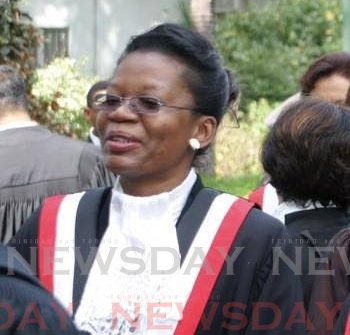Judge: No bail for murder remains the law

NO BAIL for murder remains the law as a High Court judge has delivered her ruling in a much-anticipated decision on the issue.
Refusing to declare section five of the Bail Act, which makes murder a non-bailable offence, Justice Joan Charles said a former murder accused failed to establish that the legislation directly interfered with judicial proceedings or breached the doctrine of the separation of powers to make it unconstitutional.
Charles had been asked to strike down the specific portion of the Bail Act to allow people charged with murder to apply for bail.
In her decision, Charles said she could not depart from previous decisions of the Privy Council on separation of powers, nor did she agree that the effect of the legislation removed all judicial input on the issue of granting, or refusing, bail for murder.
She pointed out that judges of the High Court, in the past, did not grant bail for murder, either at common law or by statute.
Charles said the classification of murder was a task for the legislature, and Parliament alone should determine if there should be bail for the capital offence.
“In my view, it is a function of the legislative arm of government, taking into account current societal norms and any other social factors it deems relevant, to decide whether the law relating to bail for murder ought to be repealed, amended or replaced as has happened in other Caribbean jurisdictions.
“Having determined that the impugned legislation is existing law, I consider that it would amount to judicial overreach to strike down, alter or replace the said legislation,” she said in her decision.
She also added, “While I agree that it may be a valuable exercise to consider a review of the legislation governing murder, to take account of the widely varying circumstances by which a person may take the life of another, this is a task which falls within the domain of the legislative arm of government.
“It is also for Parliament to alone determine whether the law should be amended so as to make murder a bailable offence,” as she dismissed Akili Charles' claim.
Charles was among a group of prisoners who rioted at the Port of Spain magistrates’ court when told their already five-year-old preliminary inquiry would have to restart when the former chief magistrate was made a judge. Charles had been in prison, on remand, for nine years before he was discharged when the present chief magistrate held that the evidence was insufficient for him to stand trial.
Charles’s lead attorney, Anand Ramlogan, SC, had argued that the challenge was not to get the court to change the law to give bail to murderers, but to give an accused the opportunity to apply for bail.
Agreeing with Charles’s contention was the Law Association, which appeared as an interested party in the case. President Douglas Mendes, SC, submitted it was disproportionate to apply the blanket denial of bail to different categories of murder, hypothetically referencing the difference between a contract killer and a father avenging the rape and murder of his daughter.
In resisting the claim, Senior Counsel Fyard Hosein, who represented the AG, said to allow those accused of murder the opportunity to apply for bail would “open a Pandora’s box of criminality of all sorts in the worst kind of way.”
He said it was a decision for Parliament, while admitting it would be difficult to get a three-fifths majority to have the legislature categorise murders to allow for bail, as is done elsewhere in the Caribbean.
Hosein also argued that section 5(1) of the Bail Act was saved law under section 6 of the Constitution and it was a well-established practice for people accused of murder to be refused bail.
After the arguments were heard by the judge, the case continued to receive attention, because of an exchange of words between Attorney General Faris Al-Rawi and UNC Senator Jayanti Lutchmedial, who is one of Charles’s attorneys on record.
Al-Rawi had accused the UNC senator of a conflict of interest, while she has accused him of being in contempt for discussing the case publicly while the judge deliberates.
The Prime Minister also touched on the issue of bail for murder at a PNM meeting in Belmont in February.
Dr Rowley said he would do what he had to stop any change to the law to make murder a bailable offence. “I can tell you, as long as I have anything to do with it, that ain’t going to happen in this country if I could stop it.”
Rowley did note that bail is granted in other countries but asked if that should be the case for TT.
“That is not to say bail for murder is not practised in some countries, but is that what we want in TT?
“The answer is ‘no’. I speak for you. I trust that those who make the decision would make it on the basis that the people of TT do not want that as part of our environment.”
Also representing Charles were Ganesh Saroop. Appearing with Hosein for the AG were Diane Katwaroo and Tenille Ramkissoon, while Kiel Tacklalsingh, Kavita Roop-Boodoo and Aaron Mahabir appeared for the Law Association.

Comments
"Judge: No bail for murder remains the law"